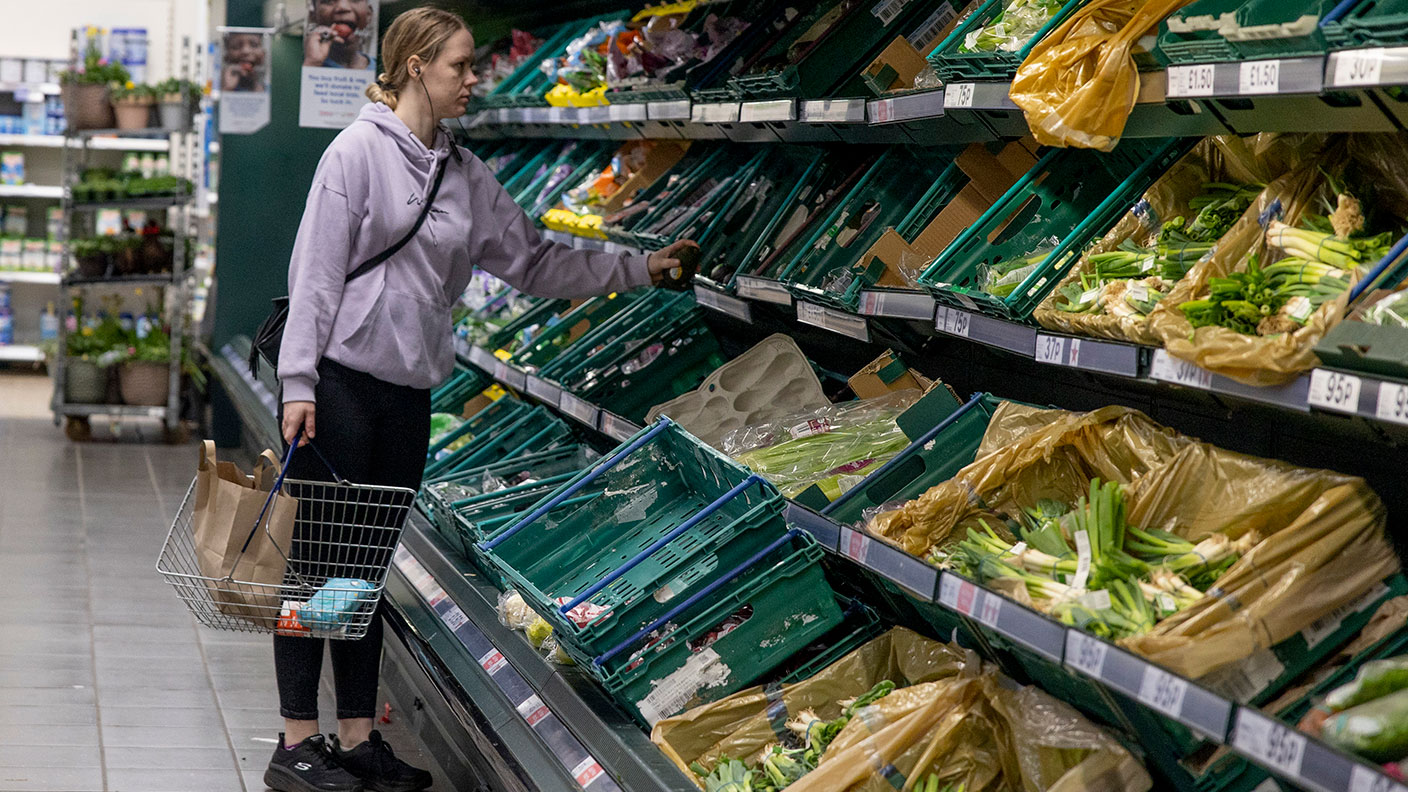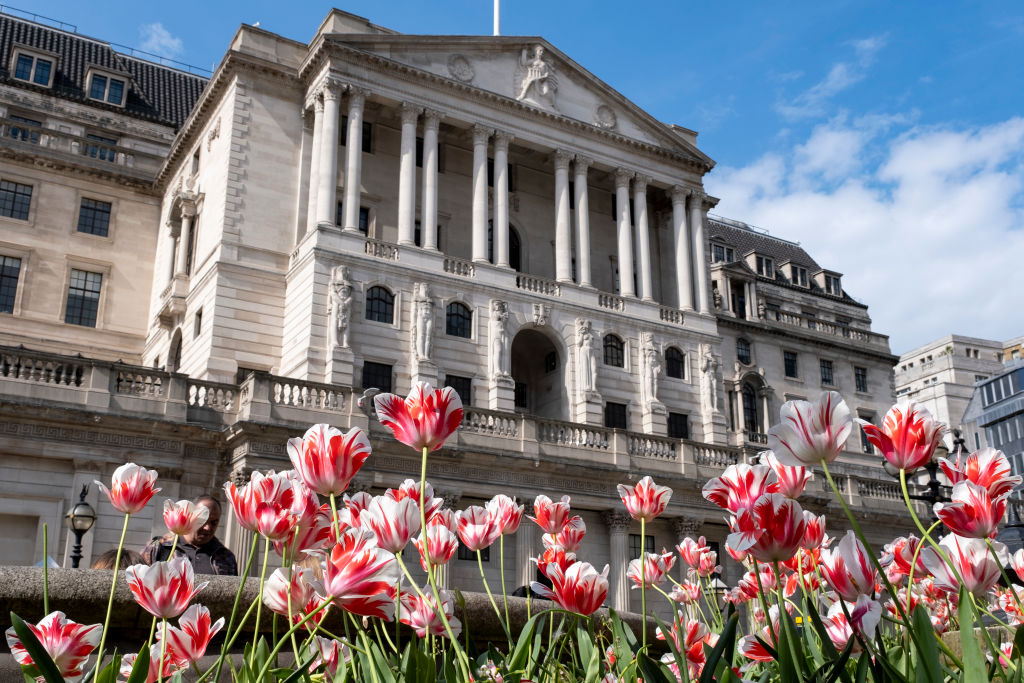Inflation in the UK just keeps on rising
UK inflation has risen to 9.1% a year – far beyond the Bank of England’s 2% target rate. And it’s likely to remain high for some time. That’s going to change everything, says John Stepek. The economy, our politics – and the way you invest.


Get the latest financial news, insights and expert analysis from our award-winning MoneyWeek team, to help you understand what really matters when it comes to your finances.
You are now subscribed
Your newsletter sign-up was successful
Want to add more newsletters?

Twice daily
MoneyWeek
Get the latest financial news, insights and expert analysis from our award-winning MoneyWeek team, to help you understand what really matters when it comes to your finances.

Four times a week
Look After My Bills
Sign up to our free money-saving newsletter, filled with the latest news and expert advice to help you find the best tips and deals for managing your bills. Start saving today!
The latest UK inflation figures are out.
Prices in May rose by 9.1% on the previous year, judged by the consumer price index (CPI). That was in line with expectations. The Bank of England is meant to keep CPI at 2.0% so it’s way beyond the target, but the Bank will at least have been relieved that it wasn’t even higher.
Judged, however, by the Bank’s old target rate, things are not so rosy. The retail price index excluding mortgage interest (RPIX) has inflation rising at an annual rate of 11.8% (the Bank target was 2.5% when they used RPIX). That was higher than expected, and the highest level since December 1981.
MoneyWeek
Subscribe to MoneyWeek today and get your first six magazine issues absolutely FREE

Sign up to Money Morning
Don't miss the latest investment and personal finances news, market analysis, plus money-saving tips with our free twice-daily newsletter
Don't miss the latest investment and personal finances news, market analysis, plus money-saving tips with our free twice-daily newsletter
(Here’s a quick guide to the difference between CPI and RPI, by the way.)
And if you look at inflation coming down the pipeline, the news was plain grim.
Factory input costs (ie, raw materials) are rising at 22.1% a year – that’s the highest since records began in January 1985. And factory gate prices (ie, the price of products leaving the factory) rose at an annual rate of 15.7% in May, which is the highest since 1977.
Those figures were higher than expected, too.
So overall, while some analysts seem to be taking heart from the very mild moderation in “core” inflation, it’s hard to suggest we should be breaking open the champagne any time soon.
Inflation is a state change for the economy
So what does all of this mean for markets and for you as an investor or saver or mortgage holder?
This is where it gets really tricky. The future is, of course, always unclear – it’s not as though the past decade has been free of surprises. However, one thing that inflation does is that it increases the level of volatility across the board. Not just volatility in the markets term (as in the ups and downs you get in any given asset), but also in politics and in the economy.
As a metaphor, you might want to think about this as being akin to the chemical state changes you get when you heat up water (chemists, look away now). Think of a low inflation or deflation environment as being like ice. It’s not very dynamic; at any given moment, you’re going to know roughly where any given molecule is.
In a more “normal” state, the economy is liquid. There’s a lot more dynamism and free movement, but it’s a fairly orderly arrangement. Between freezing point and boiling point, you’ll get increasingly energetic movement, but it’ll still be quite orderly.
But heat it up further, and eventually you get a state change. In a gas, the molecules bounce around all over the joint and you don’t know from one second to the next where they’ll be.
It’s probably not good chemistry nor particularly good economics, but you get my point. Once inflation gets to a certain level (and believe me, we’re there), volatility goes up, and it’s much harder to work out how all the moving parts are likely to fit together.
Here’s one concrete example: this week’s rail strike. Strike action hasn’t been a significant aspect of British life for a long time. But inflation changes behaviour. We might find that inflation feeds unionisation and strike action rather than the other way around.
Here’s another: hoarding. When interest rates were low or even negative, just-in-time supply chains made sense. No one wanted to sit on depreciating inventory. It made a great deal of sense to make your money by being a platform – or as we used to describe it, a middleman.
That’s no longer the case. In a world where the price of materials might rise by a percentage point on a month to month basis, it’s a good idea to stock up now.
In short, inflation changes the way people make decisions, which in turn changes everything from the investment landscape to the shape of a successful business to the employment outlook.
What this means for investors
So going back to the earlier question, what does all of this mean for investors?
Firstly, it’s hard for inflation to keep going up at its current rate. That’s just arithmetic. For example, if prices stay exactly the same as they are now and don’t fall, inflation will fall to zero in a year’s time.
There’s also the rising recession risk to consider. There is no doubt that credit is getting tighter across the world. Companies at the sharper end of that are already shutting down hiring plans. Will this tightness remain enclosed in the “boom” sectors?
My gut feeling is it probably won’t. Rising rates are starting to squeeze the US housing market, for example, and that’s not exactly the tech sector. To my mind, a recession seems more likely than not.
How big will the recession be though? I suspect it might be more of a dip than a long-running thing, although a lot depends on how central banks and governments react. No one is going to be happy about the idea of rising unemployment, for example.
If central banks (and the US Federal Reserve specifically) start to step back from rate hikes, then maybe investors might get excited at that point. But the question is: about what? I don’t think we go back to the “jam tomorrow” bubble. Nor do I think that inflation goes away.
If I was to take a wild guess as to what might happen next it would be something like: asset prices will go down (including commodities). Inflation will look like it’s tempering. Meanwhile, something significant might break or come close to breaking. The Fed will take a breather, perhaps seeing the popping of the crypto bubble as “mission accomplished”.
But commodities will come back, along with value, as inflation continues to be a problem, and we don’t get rates falling because we can’t. So you get a regime change and a whole brave new world for investors to adapt to.
But as I said that’s a best guess. Meanwhile you should stay flexible and try to think of your portfolio in terms of avoiding “fragile” (in the Taleb sense) assets.
Get the latest financial news, insights and expert analysis from our award-winning MoneyWeek team, to help you understand what really matters when it comes to your finances.

-
 Should you buy an active ETF?
Should you buy an active ETF?ETFs are often mischaracterised as passive products, but they can be a convenient way to add active management to your portfolio
-
 Power up your pension before 5 April – easy ways to save before the tax year end
Power up your pension before 5 April – easy ways to save before the tax year endWith the end of the tax year looming, pension savers currently have a window to review and maximise what’s going into their retirement funds – we look at how
-
 Why Scotland's proposed government bonds are a terrible investment
Why Scotland's proposed government bonds are a terrible investmentOpinion Politicians in Scotland pushing for “kilts” think it will strengthen the case for independence and boost financial credibility. It's more likely to backfire
-
 How have central banks evolved in the last century – and are they still fit for purpose?
How have central banks evolved in the last century – and are they still fit for purpose?The rise to power and dominance of the central banks has been a key theme in MoneyWeek in its 25 years. Has their rule been benign?
-
 UK to have highest inflation among advanced economies this year and next, says IMF
UK to have highest inflation among advanced economies this year and next, says IMFThe International Monetary Fund (IMF) says it expects inflation to remain high in the UK, while lowering economic growth forecasts for 2026.
-
 Is Britain heading for a big debt crisis?
Is Britain heading for a big debt crisis?Opinion Things are not yet as bad as some reports have claimed. But they sure aren’t rosy either, says Julian Jessop
-
 'Britain is on the road to nowhere under Labour'
'Britain is on the road to nowhere under Labour'Opinion Britain's economy will shake off its torpor and grow robustly, but not under Keir Starmer's leadership, says Max King
-
 'Governments are launching an assault on the independence of central banks'
'Governments are launching an assault on the independence of central banks'Opinion Say goodbye to the era of central bank orthodoxy and hello to the new era of central bank dependency, says Jeremy McKeown
-
 Why investors can no longer trust traditional statistical indicators
Why investors can no longer trust traditional statistical indicatorsOpinion The statistical indicators and data investors have relied on for decades are no longer fit for purpose. It's time to move on, says Helen Thomas
-
 Live: Bank of England holds UK interest rates at 4.5%
Live: Bank of England holds UK interest rates at 4.5%The Bank of England voted to hold UK interest rates at their current level of 4.5% in March, as widely anticipated, after inflation rose to 3% in January